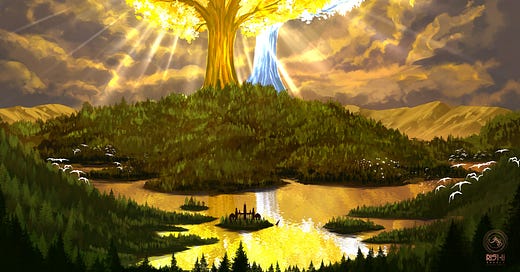The Music of Solstice in The Silmarillion: Mortality, Hope, and the Hidden Triumph
Few could foresee that, in that hour, Ilúvatar triumphed over evil through weakness, as it had been foresung in the Music of old.
What is solstice? It’s more than the Sun’s “standing” in the sky—it’s a powerful symbol of the power of Light in our lives.
In J.R.R. Tolkien’s lore, Iluvatar’s children are not created; they are awakened. The Elves awaken at the bay of Cuivienen and for a long age gaze upon the stars of Varda. Men, the Second-born, awaken with the first risi…
Keep reading with a 7-day free trial
Subscribe to Philosophy of Language to keep reading this post and get 7 days of free access to the full post archives.




